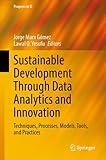Sustainable Development Through Data Analytics and Innovation [electronic resource] : Techniques, Processes, Models, Tools, and Practices /
Material type: TextSeries: Progress in ISPublisher: Cham : Springer International Publishing : Imprint: Springer, 2022Edition: 1st ed. 2022Description: X, 189 p. 1 illus. online resourceContent type:
TextSeries: Progress in ISPublisher: Cham : Springer International Publishing : Imprint: Springer, 2022Edition: 1st ed. 2022Description: X, 189 p. 1 illus. online resourceContent type: - text
- computer
- online resource
- 9783031125270
- 658.4038 23
- HF54.5-.56
Chapter 1. The Impact of Business Analytics on Industry, Education and Professional Development -- Chapter 2. Green Purchasing Behavior on Social Media: A Goal-framing Theory Perspective -- Chapter 3. Business Analytics and Sustainability -- Chapter 4. Data Science and External Audit -- Chapter 5. Digitalization in Passengers’ Air Travel -- Chapter 6. Application of Blockchain Innovative Technology in Logistics and Supply Chain Management: A New Paradigm for Future Logistics -- Chapter 7. Industry 4.0: Drivers and Challenges in Developing the Smart Supply Chain Management -- Chapter 8. Reimaging Corporate Reporting in a Digital Economy Through Accounting Data Analytics -- Chapter 9. Responding to Covid-19 Emergency: The Packaging Machinery Sector in Italy -- Chapter 10. Achieving Sustainable Development Through Green HRM: The Role of HR Analytics -- Chapter 11. Understanding Malaysian B40 Schoolchildren's Lifestyle and Educational Patterns Using Data Analytics.
Sustainable development is based on the idea that societies should advance without compromising their future development requirements. This book explores how the application of data analytics and digital technologies can ensure that development changes are executed on the basis of factual data and information. It addresses how innovations that rely on digital technologies can support sustainable development across all sectors and all social, economic, and environmental aspects and help us achieve the Sustainable Development Goals (SDGs). The book also highlights techniques, processes, models, tools, and practices used to achieve sustainable development through data analysis. The various topics covered in this book are critically evaluated, not only theoretically, but also from an application perspective. It will be of interest to researchers and students, especially those in the fields of applied data analytics, business intelligence and knowledge management.


There are no comments on this title.